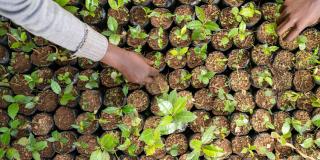
Thematic Partnership Lead for Resilient Livelihoods, Vladymir Rivera, recounts his experience of visiting our agroecology project in Siaya, Kenya.
"After an hour flight from Nairobi and another 30-minute drive from the city centre of Kisumu in Kenya, we met Millicent and the other members of Frontier in the village of Sirembe, at Gem, Siaya County. Frontier is a group of women organised in 2018 and registered in 2020 primarily to fill the gap in the supply of vegetables at Sirembe market.
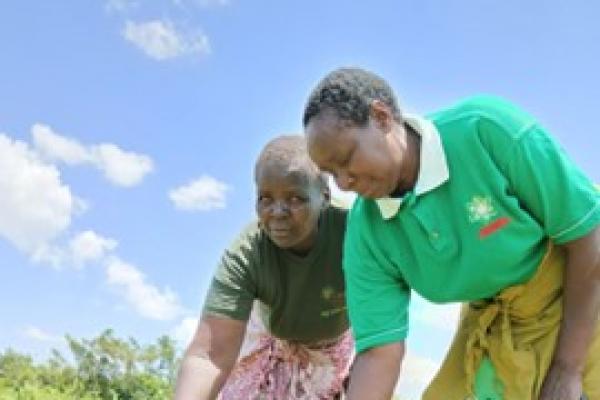
Collectively, the members of the group produce a range of staples like maize and beans, leafies like amaranth (mchicha) and kales, root crops such as cassava and sweet potato, as well as fruits, which are in regular demand at the local markets in Sirembe.
Back in 2018 when the group was just starting, the women formed themselves around the idea of doing something together to improve their incomes and generate earnings to support their own family’s household upkeep. All members of Frontier are engaged in individual plot cultivation, many of them engaged in a contract growing scheme where they get the seeds (maize) and fertilizer inputs on loan. Although some of them admit that they barely make income from it, participating in the scheme allows them to make ends meet.
To supplement their income, they decided to do collective farming where they divide the farm work amongst themselves and share the income equitably. In this collective effort, they practice rotational multi-cropping of fruits, cereals, root crops and vegetables without the use of chemical fertilizers and pesticides.
When they earn money from selling the produce, part of the earnings goes to a savings scheme called “table banking” which allows members to contribute to a money pool from which they can also borrow.
Close to where Frontier is located, another group of women, Greenlink, is engaged in a similar initiative. Greenlink started in March 2015, got themselves registered in 2020 and is composed currently of 13 members headed by Carolyn. Like Frontier, they were organised around providing employment and livelihood to women who were having difficulty finding jobs or sources of income.
Each member of the group also cultivates own plot, usually planted with maize, beans, kales, and a few indigenous food crops. Some engage in contract farming, while others are content with own kitchen gardens. In a way, these women are creating green jobs for themselves while saving, exchanging, and conserving indigenous seeds.
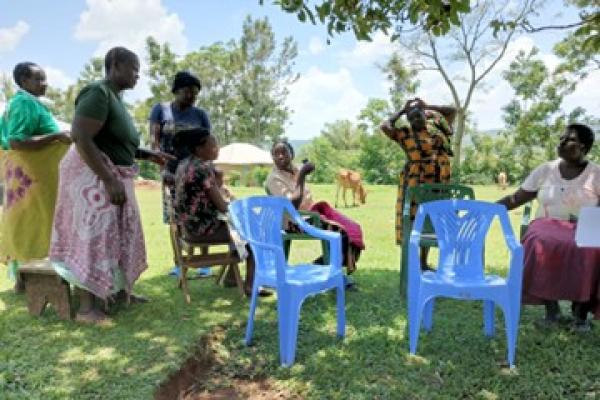
Notably, in this part of Siaya, unsold agricultural produce is also valorised as barter goods, e.g., a few sacks of maize can be used by parents to pay for their children’s tuition fees – a unique rural custom that may sound out-of-place in era of bitcoins and digital payments but nevertheless fulfils the exchange of goods and services in a more inclusive, non-alienating way.
In that sense, these women are contributing (albeit unconsciously) in the growth of the green economy. In fact, the act itself also shares strong resonances with the idea of social and solidarity economy.
Funded by the UK government’s Foreign, Commonwealth and Development Office (FCDO), VSO accompanies both women groups in their journey by working with volunteers to improve their skills through capacity trainings, widen their network by linking them with relevant government ministries and social services, and harness their potential by engaging them in projects that lead to climate-resilient livelihoods.
At times, VSO provides material resources, like in the case of Greenlink, a solar-powered irrigation pump that draws water from a nearby creek to supply the group’s collective vegetables farm. Other times, VSO provides seedlings of fruit or wood trees. But while these material contributions may have helped them improve their farming initiative, it is the development of their skills, the raising of their awareness about rights, and the rediscovery of new-found confidence that the women said VSO helped them transform into active citizens. The women said these kinds of support are the biggest benefits of working with VSO.
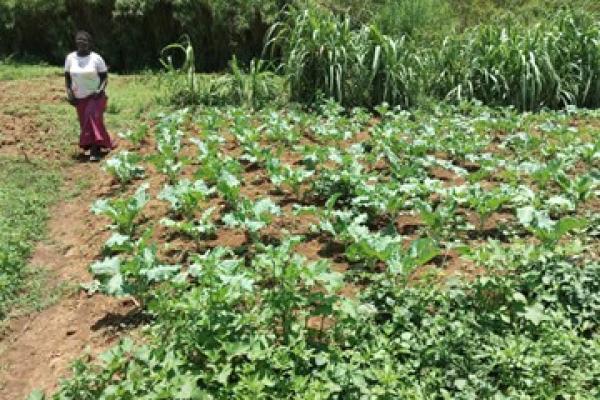
Beyond their farming success, Millicent and the members of Frontier show the inherent capacity of women to rise above difficult conditions, find power in each other, and cultivate resolve to chart their own destiny. Their stories also connect the unmistakable link between access to resources and empowerment.
Carolyn donates part of her land to Greenlink for use as their collective farm – an act that speaks of the kind of solidarity these women have for each other. We inquired about how long she will let use of her land, she said for as long as it is needed. Because in their working together and drawing strength from each other, they were able to catalyse a culture of self-determination within the group.
Interestingly, there are estimates that only around 30% of arable land in the world are accessed by smallholder farmers – like the women of Frontier and Greenlink – to produce about 70% of the world’s food. Think about it. How much food can be grown, how many forms of livelihoods can be supported, and how big a population of young people can be employed, if only poor people had access to the remaining 70% of the world’s arable land? Enormous. It can rewire the system and tilt the balance of power in favour of the world’s poor and hungry that now numbers over a billion.
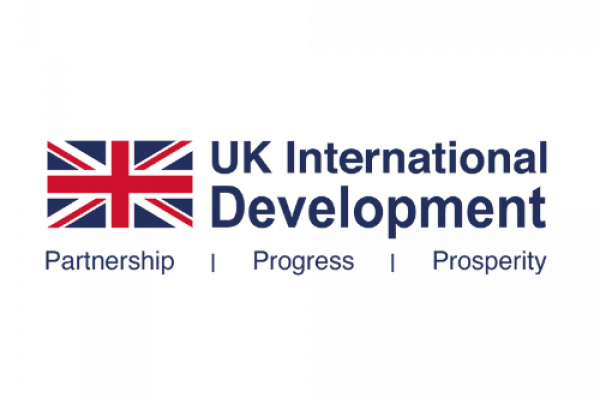
As I write this piece, the UNFCC COP27 is happening and there is great anticipation as to how negotiations will pan out to put agroecology at the centre of wide actions on climate change and food security. Governments are being called to commit to, and put their money, in the realisation of the transformative potential of agroecology in creating climate resilient livelihoods and food systems especially for the poor, marginalised, and most vulnerable
They are also being made to account for the climate-related losses and damages and underwrite the climate financing facility that is necessary in the rebuilding process. Will they listen and act? If so, to what extent?
As we head back to Nairobi from our brief visit of Siaya, we could not help but asked ourselves, what would it take to repair the broken systems in ways that reconfigure the structures of power? What combination of big steps and small strides would lead us to a state of sustainability that is based on social, economic and climate justice?"
Want to know more?
Read more

The two volunteers empowering girls and young women in Mozambique
Nelma and Carmirene and are two volunteers working on VSO's EAGLE project in Mozambique. For Nelma and Carmirene, education is not just about school, it is about meeting people where they are and using the right tools to challenging harmful norms. Here are their stories.
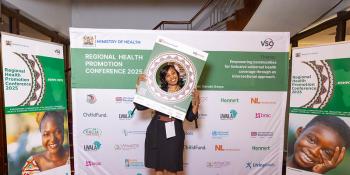
In photos: Our Regional Health Promotion Conference 2025
Check out some of our favourite photos from Regional Health Promotion Conference (RHPC25). This event sought to reimagine Universal Health Coverage through the lens of intersectionality.
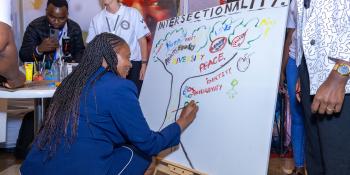
Using intersectionality to create healthy beginnings and hopeful futures
World Health Day brings global attention to the urgent need to end preventable maternal and newborn deaths. Learn more about how our Regional Health Promotion Conference is tackling these issues head on.
